What makes an event unforgettable and successful? It's all about careful planning, strategic execution, and knowing your audience. By using smart event planning strategies, you can create an experience that goes beyond what people expect. This guide will share key tips to turn any event into a memorable success.
Mastering these event launch strategies ensures your events are unforgettable. They provide a great experience for attendees and help achieve your goals, like generating leads or boosting brand exposure. Effective planning is key to a successful event launch. By following these tips, you can make your event memorable and worthwhile.
Key Takeaways
- Successful events meet their goals and provide a positive experience for attendees, leading to a successful event launch.
- Effective event planning strategies, such as setting clear goals and choosing an ideal venue, are crucial for a successful event launch.
- Attendee engagement, smooth execution, and staying within budget are key factors for measuring the success of an event.
- A comprehensive budget and detailed timeline are essential for a successful event launch, helping to prevent financial overruns and ensure smooth execution.
- Post-event follow-up, including thank-you emails and feedback surveys, reinforces connections with attendees and provides insights for improving future events, making it a crucial aspect of event launch tips.
- Event planning strategies, such as leveraging technology and tailoring the event experience to the audience, can enhance attendee engagement and improve event outcomes, leading to a successful event launch.
Understand Your Target Audience
Knowing who your audience is is key to a great event launch. You need to understand their likes, dislikes, and how they behave. This is where event management best practices help, making your event special for them.
To find your audience, look at who has come to your events before. Also, check out what's happening in your industry and what people are talking about. Tools like Google Analytics can tell you about your audience's age, gender, and what they like. Social media can give you clues about their interests and how they act. Using these event marketing techniques, you can make ads that really speak to your audience.
When figuring out your audience, think about a few important things:
- Demographics: age, gender, income, location
- Interests: hobbies, passions, industries
- Behaviors: how they shop, how they attend events

Knowing your audience well lets you make an event that they'll love. This can mean more people coming, more fun, and a better event overall. Always keep your audience in mind and tweak your event marketing techniques to get the best results.
Set Clear Goals for Your Event
Defining success is key for a successful event launch. You need clear, measurable goals that match your brand vision and business aims. These goals should be specific, measurable, attainable, realistic, and time-based, making them SMART goals. Examples include boosting ticket sales, raising brand awareness, and selling event tickets.
When planning an event, it's vital to think about event planning strategies to reach these goals. This means understanding your target audience, making a detailed budget plan, and setting a strategic timeline. With clear goals and smart planning, event organizers can make their event a hit and meet their goals.
Some common event goals and objectives include:
- Increasing ticket sales or registration
- Creating brand awareness
- Selling event tickets
- Generating leads
- Improving customer engagement

By setting clear goals and using effective event planning strategies, event organizers can create a successful event launch. This ensures a positive experience for attendees and meets the desired outcomes.
| Event Goal | Measurement |
|---|---|
| Increase ticket sales | Track ticket sales revenue |
| Improve customer engagement | Monitor social media mentions and attendee feedback |
Create a Comprehensive Budget Plan
When starting a new event, making a detailed budget plan is key. It should cover all costs, from renting a venue to marketing. Event management best practices say a clear budget stops overspending and makes sure money goes to important parts of the event.
A good budget plan also has a backup fund for unexpected costs. This fund helps avoid financial trouble and keeps things flexible. By keeping an eye on spending, event planners can keep their event on track financially.
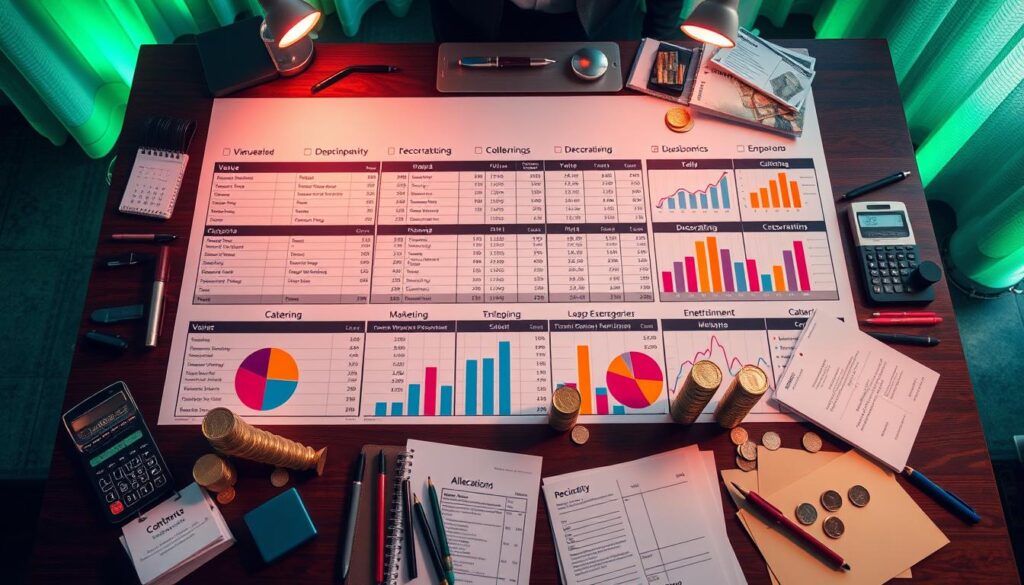
To make a solid budget plan, event planners should follow these steps:
- Make a list of all expected costs, like venue rental, marketing, and staff.
- Set aside money for unexpected costs.
- Watch and adjust spending as you plan the event.
By taking these steps and using event management best practices, event planners can make their event a success. They'll reach their goals when they launch a new event.
Choose an Appropriate Venue
Choosing the right venue is key when planning an event. It sets the stage for the whole experience. Event coordination tips stress the importance of size, accessibility, and ambiance. The venue affects logistics, comfort, and the overall event experience.
When picking a venue, consider these factors:
- Size and capacity: Make sure it fits the number of guests you expect.
- Accessibility: Look at how easy it is to get to and if there's parking.
- Ambiance: Think about the venue's decor and if it matches what you want.
By thinking about these points and following event launch tips, you can make your event memorable. It's also smart to book a venue 8 months in advance. This gives you time to plan other important event details.
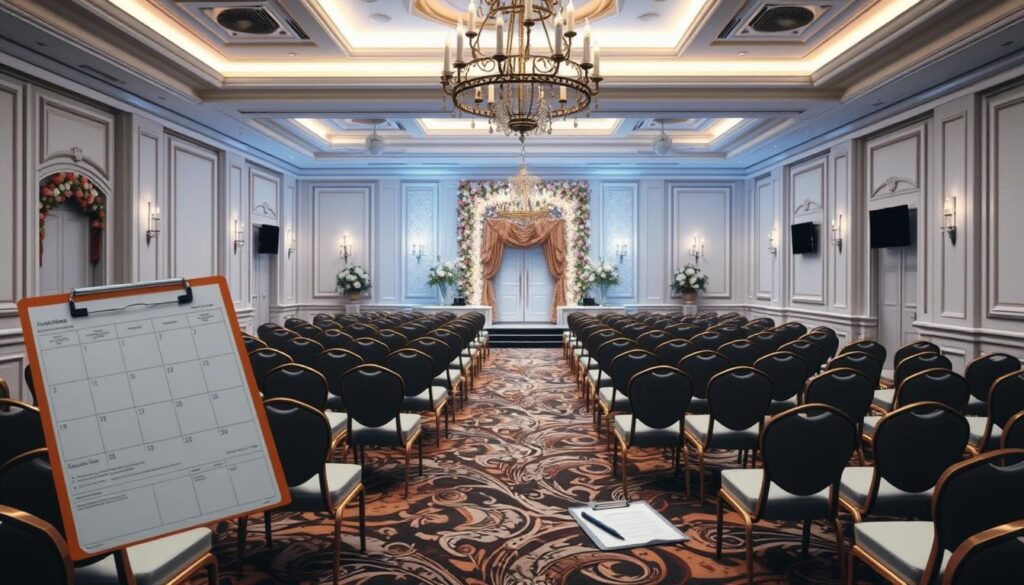
Venues might offer discounts for off-peak or weekday bookings. Think about the space you need, extra services, the season, location, and how long your event will last. This helps estimate costs.
| Venue Factor | Considerations |
|---|---|
| Size and Capacity | Estimated number of attendees, flexibility in room setup |
| Accessibility | Proximity to transportation hubs, parking facilities, wifi and internet access |
| Ambiance | Existing decor, ability to meet desired ambiance, catering options |
Develop a Strategic Timeline
Creating a detailed timeline is key to good event planning. It helps manage every part of the event well. This includes planning before, during, and after the event. By setting milestones for booking vendors, selling tickets, and promoting the event, you can keep things on track.
Using tools like Trello or Asana helps manage the timeline. Event management best practices say it's important to check in regularly. This ensures the event stays on schedule. Set clear goals and assign roles to your team to help.
When making a timeline, consider a few things:
- Make a detailed budget plan
- Set goals and track progress
- Work with vendors and stakeholders
- Plan a promotional campaign
By using these strategies and event management best practices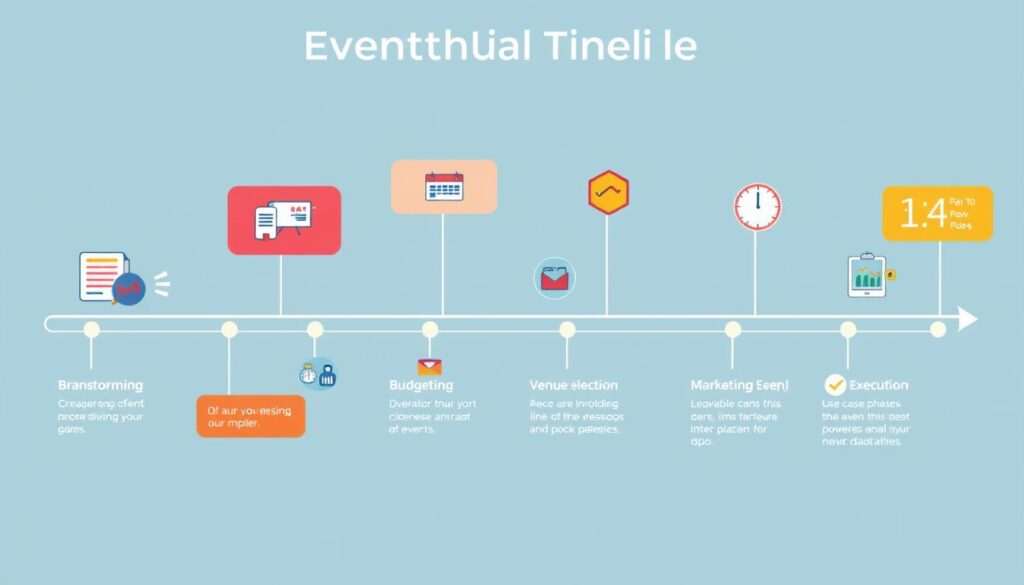
| Stage | Milestones | Deadlines |
|---|---|---|
| Pre-planning | Vendor booking, budget planning | 6-8 weeks before the event |
| Post-planning | Ticket sales, promotional campaign | 4-6 weeks before the event |
| Post-event | Evaluation, feedback collection | 1-2 weeks after the event |
Build a Compelling Event Theme
When you launch a new event, picking a theme that speaks to your audience is key. Good event marketing can make your event unforgettable. A catchy theme boosts engagement and gets people talking.
To craft a great event theme, think about these points:
- Make sure the theme fits your event's goals and what your audience likes
- Keep up with trends and research to stay fresh
- Use pictures and videos to grab people's attention with your event ads
A strong theme can make your event stand out and draw more people. Use social media and Google Analytics to learn about your audience. A clear event description and title can also boost attendance and excitement.
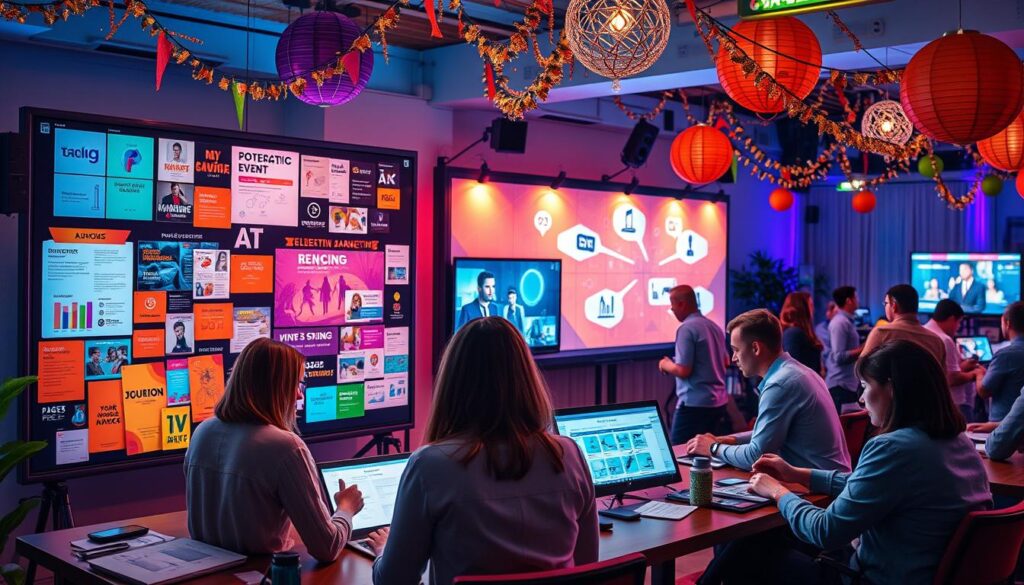
By following these tips and using event marketing, you can create a theme that impresses your guests. This will help your event succeed.
| Event Theme | Target Audience | Event Objectives |
|---|---|---|
| Unique and creative | Aligned with preferences | Clearly defined |
Utilize Effective Marketing Techniques
To make an event buzz-worthy, using smart marketing is key. This means using social media like Twitter, LinkedIn, and Instagram to talk to your audience. Event publicity ideas can also include paid ads and sponsored content for quick visibility. But, these methods can be pricey.
Another important part is event promotion tactics. Working with influencers can really help spread the word. It's best if their followers match your event's target audience. Also, listing your event on sites like Eventbrite or Meetup can attract more people.
Some top event promotion tactics include:
- Make sure event pages are easy to find and have all the details
- Use blogs, videos, and podcasts to teach and get people excited for your events
- Join niche forums and groups for in-depth talks with people who really care

By using these methods, event planners can get more people to know about their brand. They can also make more money and build strong relationships with their audience. Remember, your event publicity ideas and event promotion tactics should fit your audience and event goals.
| Marketing Technique | Benefits |
|---|---|
| Social Media | Engage with target audience, increase brand awareness |
| Influencer Collaboration | Enhance event message, reach new audience |
| Content Marketing | Educate audience, build anticipation for events |
Engage Attendees with Interactive Activities
Active engagement makes an event memorable. Plan for workshops, Q&A sessions, and networking. These activities encourage people to get involved. By using event management best practices, like live polls and demos, attendees can dive deeper into the event.
This approach can make the event launch a success. People will feel valued and motivated.
Here are some ideas for interactive activities:
- Workshops and demonstrations
- Live polling and Q&A sessions
- Networking opportunities, such as structured networking sessions and speed meetings
These activities make the event memorable. They also give valuable insights and engagement chances for organizers. By using event management best practices, like gamification and rewards, people are more likely to participate.

By adding these activities to the event plan, organizers can make a lasting impression. This can boost brand awareness, customer loyalty, and revenue. It makes the event a smart investment for the organization.
| Interactive Activity | Benefits |
|---|---|
| Workshops and demonstrations | Provides hands-on experience and valuable insights |
| Live polling and Q&A sessions | Encourages participation and provides real-time feedback |
| Networking opportunities | Fosters connections and collaboration among attendees |
Ensure Professional Audio-Visual Setup
For a successful event, a top-notch audio-visual setup is key. High-quality speakers, amplifiers, and microphones are essential. They ensure everyone can hear and see well, based on the audience size.
Doing a full technical rehearsal is vital to avoid last-minute issues. This includes checking acoustics, lighting, and power access. Events with live streaming or recording need professional cameras and capture cards for quality video.
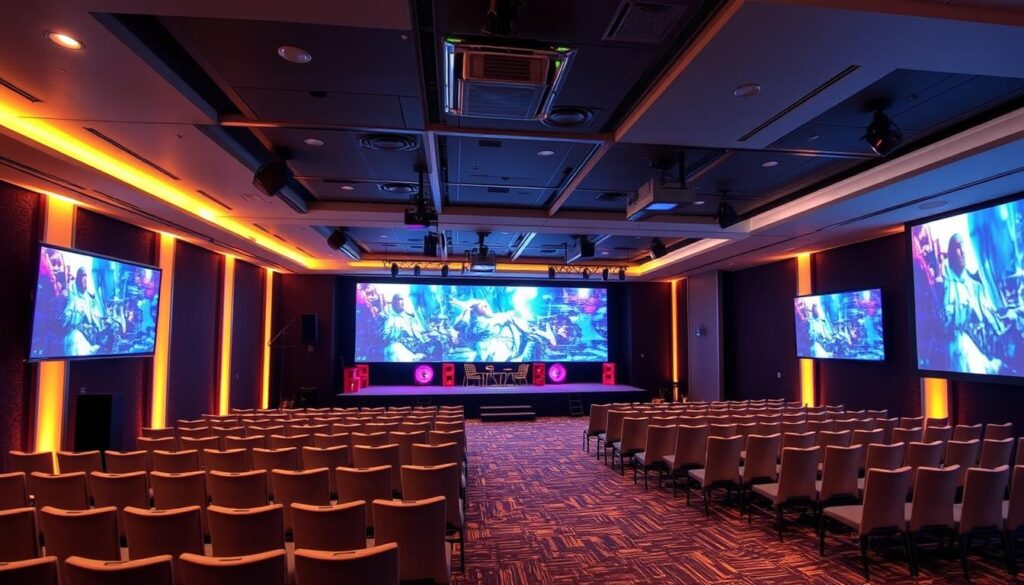
- Ensuring a minimum of two subwoofers are in place to maximize the impact of low-end effects or bass lines
- Inquiring about technical details such as PA suitability and lighting fixtures to gauge the competence and organization of audio-visual teams
- Utilizing digital branding and creative support from audio-visual companies to transform event spaces into immersive experiences
By following these tips and using professional AV setups, event organizers can create a memorable experience. This leads to a successful event launch.
Prepare for Contingencies
Even the best plans can face unexpected challenges. It's key to have plans for common issues like tech failures, speaker no-shows, or bad weather. These event planning strategies help keep the event on track.
A good contingency plan starts with spotting risks, sorting them by how bad they could be and how likely they are. Then, you need to have a plan for how to deal with them. This includes having backup speakers or extra tech gear ready. It's also important to keep your plan up to date.
Contingency plans can cover a lot, like bad weather, no-show speakers, or tech issues. Having a plan helps keep the event running smoothly. It also makes the event look good. By planning ahead, event organizers can give their attendees a great experience.

- Identifying potential risks and prioritizing them based on severity and probability
- Defining response strategies and establishing communication channels
- Having backup solutions in place, such as alternative presenters or spare audio-visual equipment
- Regularly reviewing and updating the contingency plan to ensure its effectiveness
By thinking ahead and planning for the unexpected, event organizers can make sure their event is a success. Good event management, including having a contingency plan, is crucial for a great experience for everyone.
Provide Exceptional Customer Service
Exceptional customer service is key for a successful event launch. Studies show that 90% of successful events owe it to great customer service. This shows how important it is to train staff well.
Training team members can boost customer satisfaction by 15%. Also, solving problems before they happen can cut down negative experiences by 70%. Following best practices in event management helps keep clients and guests happy.
Some important ways to offer great customer service include:
- Investing in staff development and training
- Anticipating and solving potential problems
- Clear communication and responsiveness to customer needs
- Engaging with guests and creating a welcoming atmosphere
By using these strategies, event planners can make sure their events are a hit. This is crucial in the event planning world, where knowing what clients want is everything.

Create a Post-Event Strategy
After the event, it's key to keep in touch with attendees and learn for the next time. Good event planning strategies include sending thank-you emails and sharing event highlights. Also, asking for feedback through surveys is a must. This shows you care and helps improve your event marketing techniques.
A solid post-event plan helps measure success and shows the event's value. By looking at what attendees say, you can spot what to work on next. Key parts of a good post-event strategy are:
- Follow-up communication: Send personalized emails or messages to attendees, thanking them for their participation and requesting feedback.
- Feedback analysis: Use online surveys or focus groups to collect comprehensive event satisfaction data and identify areas for improvement.
- Logistics evaluation: Document logistical successes and issues to enhance operational efficiency and inform future event planning.

With a good post-event plan, you can keep improving, keep attendees happy, and make future events better. The right event marketing techniques and event planning strategies make events a strong way to grow your brand and business.
| Post-Event Strategy | Benefits |
|---|---|
| Follow-up communication | Builds relationships, encourages feedback |
| Feedback analysis | Identifies areas for improvement, informs future events |
| Logistics evaluation | Enhances operational efficiency, reduces costs |
Foster Partnerships and Collaborations
Launching a new event? It's key to build strong partnerships and collaborations. These can help you reach more people, get more resources, and make your event better. By finding the right partners and agreeing on good terms, everyone wins.
For great partnerships, focus on effective communication, clear roles and responsibilities, and shared goals. A solid base for working together is crucial. This means:
- Defining a clear product vision and value proposition
- Establishing open communication channels
- Using collaborative tools to facilitate coordination and feedback
By following these tips and valuing partnerships, you can host a successful and memorable event. 
| Partnership Type | Benefits |
|---|---|
| Strategic Partnerships | Expanded reach, additional resources, and increased credibility |
| Collaborative Partnerships | Shared knowledge, expertise, and risk |
| Community Partnerships | Increased engagement, loyalty, and brand awareness |
Emphasize Sustainability Practices
As event management evolves, focusing on sustainability is key. By choosing eco-friendly options and reducing waste, events can lessen their environmental harm. The Events Industry Council says sustainable practices can cut costs by 20-30% and waste by 60-80%.
To host sustainable events, use digital tools, cut paper use, and pick green catering. Selecting sustainable materials and promoting eco-friendly travel can also help. For instance, choosing LEED-certified venues or hybrid events can lower carbon emissions.
Here are some benefits of sustainable event planning:
- Attract more attendees
- Reduce costs
- Create a greater impact
- Boost engagement with attendees
- Provide richer data from event tech
- Enhance company reputation
- Contribute to environmental care

By adopting these practices, event planners can positively impact the environment. They also improve their company's image and save money. Deloitte reports, 67% of companies now use sustainable materials in their events, showing sustainability's growing role in the industry.
| Benefits of Sustainable Events | Description |
|---|---|
| Cost Reduction | 20-30% reduction in costs |
| Waste Reduction | 60-80% reduction in waste |
| Environmental Impact | Minimized carbon footprint |
Keep the Event Flow Smooth
For a successful event, a smooth flow is key. Good event planning tips can make your event unforgettable. It starts with careful planning of the schedule. This includes times for performances, guest talks, seminars, and networking.
Timekeeping is also crucial to avoid delays. Using event technology like apps and QR code scanners helps with check-in. By planning the event layout well, you can reduce queues and improve the flow. This makes your event a success.
Here are some strategies for a smooth event flow:
- Design event layouts that guide attendees easily from one place to another.
- Use signs, arrows, or floor markings to help attendees find their way.
- Implement crowd management strategies for busy areas.
- Have backup plans ready for unexpected issues like weather changes or technical problems.
By following these tips, event planners can ensure a great experience for everyone. This leads to a successful event launch. 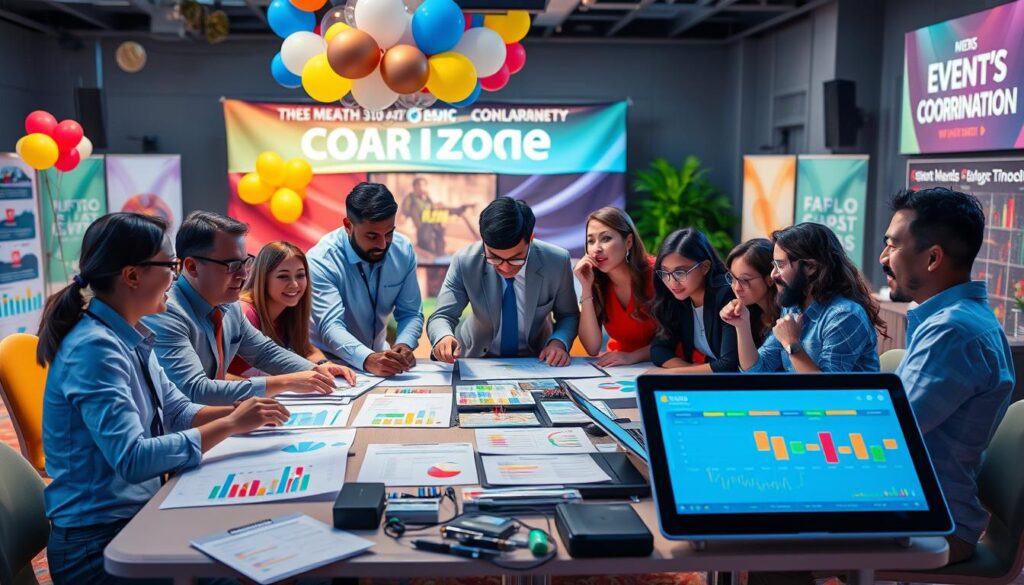
Contact Us for Assistance
Starting your event planning journey? You don't have to do it alone. The team at Alcorprime is ready to offer expert help and support. We aim to make your event a success.
Need help with planning, marketing, or logistics? Our experienced team is here for you.
Want to get in touch? Call us at
+62 21 2948 8557
or send a WhatsApp message to +62 818 616 006
Or email us at
hello@alcorprime.com
. Our office is open from
09:00 to 18:00 (GMT +7)
. We're eager to talk about your event and offer solutions to make it stand out.
With the right planning and our help, your event can impress your audience. It can meet your goals and make a lasting impact. So, don't wait to reach out. We're here to support you every step of the way.
FAQ
What are the 10 essential tips for a successful event launch?
To launch an event successfully, start by understanding your audience. Set clear goals and create a detailed budget. Choose a venue that fits your needs and plan a timeline.
Build a theme that draws people in. Use marketing to get the word out. Make sure activities are fun and engaging. Have good audio-visual equipment and plan for any surprises.
Why is it important to understand your target audience for an event?
Knowing your audience helps tailor the event to their likes. This makes the event more enjoyable and satisfying. It's key to a successful event.
How can setting clear, measurable goals impact an event's success?
Clear goals guide all your event decisions. They make sure everything works together towards your vision. This leads to a successful event.
What are the key considerations when creating a comprehensive budget plan?
List all costs and save for unexpected expenses. Keep track of spending to stay on budget. A good budget plan helps avoid financial stress and keeps things flexible.
How can the selection of an appropriate venue impact the event's success?
The right venue makes the event better. Consider size, accessibility, and atmosphere. These factors greatly affect attendee happiness and the event's success.
Why is a strategic timeline important for event planning and execution?
A good timeline breaks down the event into steps. It sets milestones and assigns tasks. This reduces stress, boosts efficiency, and ensures everything is done on time.
What role does a compelling event theme play in the success of an event launch?
A great theme connects with your audience and meets your goals. It makes the event memorable, boosting engagement and word-of-mouth.
What are the key marketing strategies to effectively promote an event?
Use social media, email, and influencers to promote. These strategies increase visibility and attendance. They create excitement around your event.
How can interactive activities enhance the attendee experience at an event?
Activities like workshops and live polls engage attendees. They lead to higher satisfaction and better networking. This makes the event memorable.
Why is a professional audio-visual setup important for a successful event launch?
Good audio-visual equipment ensures smooth presentations. It makes the event experience better. This is crucial for a successful event.
How can proper contingency planning contribute to the success of an event launch?
Plan for risks and have an emergency plan. Having backup suppliers gives you peace of mind. This ensures your event goes well, even with surprises.
What role does exceptional customer service play in the success of an event?
Great customer service improves the attendee experience. It leads to positive reviews and more successful events. It's essential for a good event.
Why is a well-planned post-event strategy important?
A good post-event plan keeps attendees engaged. It helps improve future events. It shows the event's value and success.
How can fostering partnerships and collaborations enhance an event's success?
Partnerships expand your reach and add value. They make your event better. This boosts your event's success.
Why is incorporating sustainability practices important in event planning?
Sustainability reduces environmental impact. It appeals to eco-conscious attendees. It can also save costs.
What are the key elements in maintaining a smooth event flow?
Good schedule management and timekeeping are key. They improve the attendee experience and reduce stress. They're crucial for a successful event.
How can event planners receive further assistance for their event launch?
For help, contact +62 818 616 006 (WhatsApp), email hello@alcorprime.com, or visit the office. They offer professional support for your event planning.





